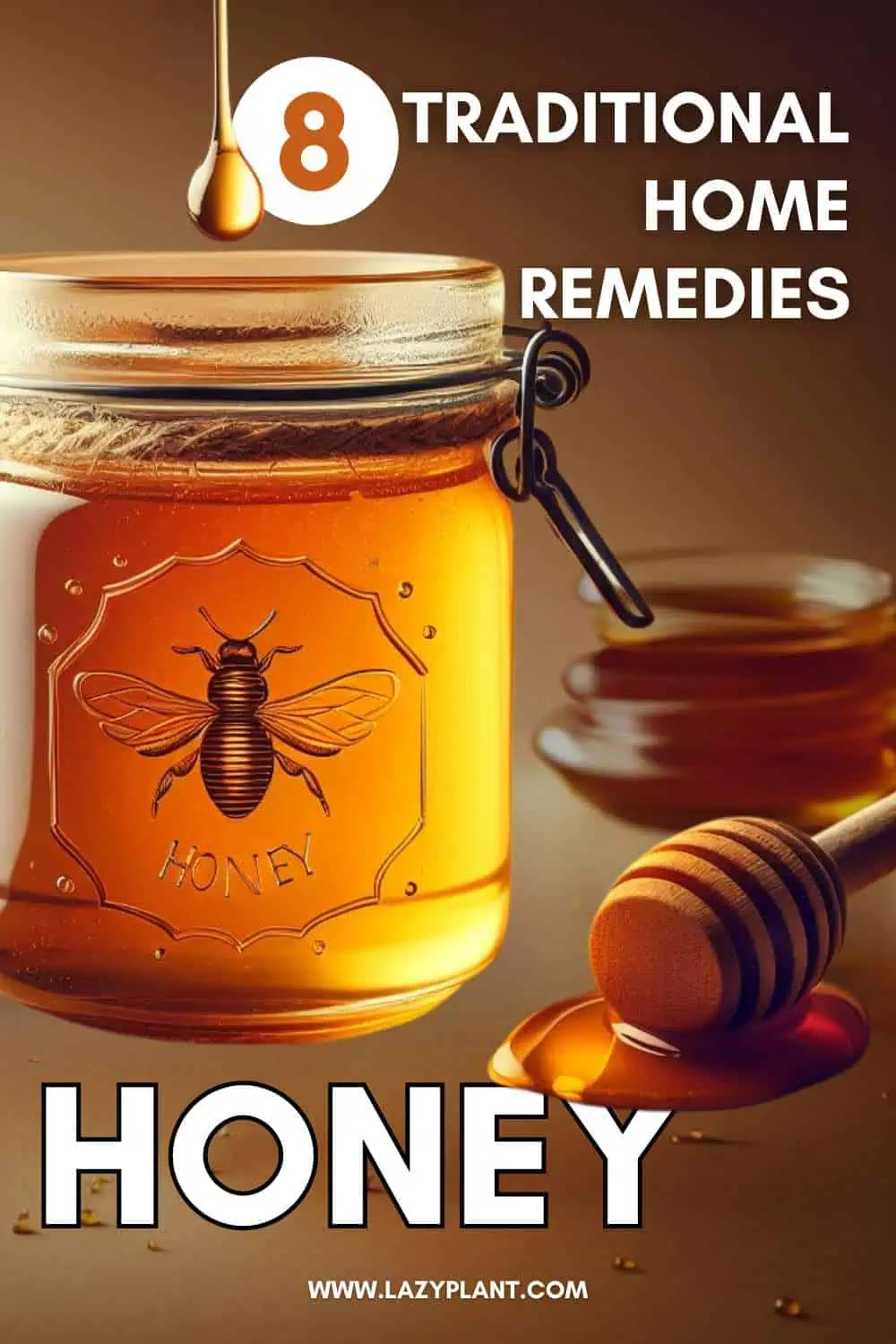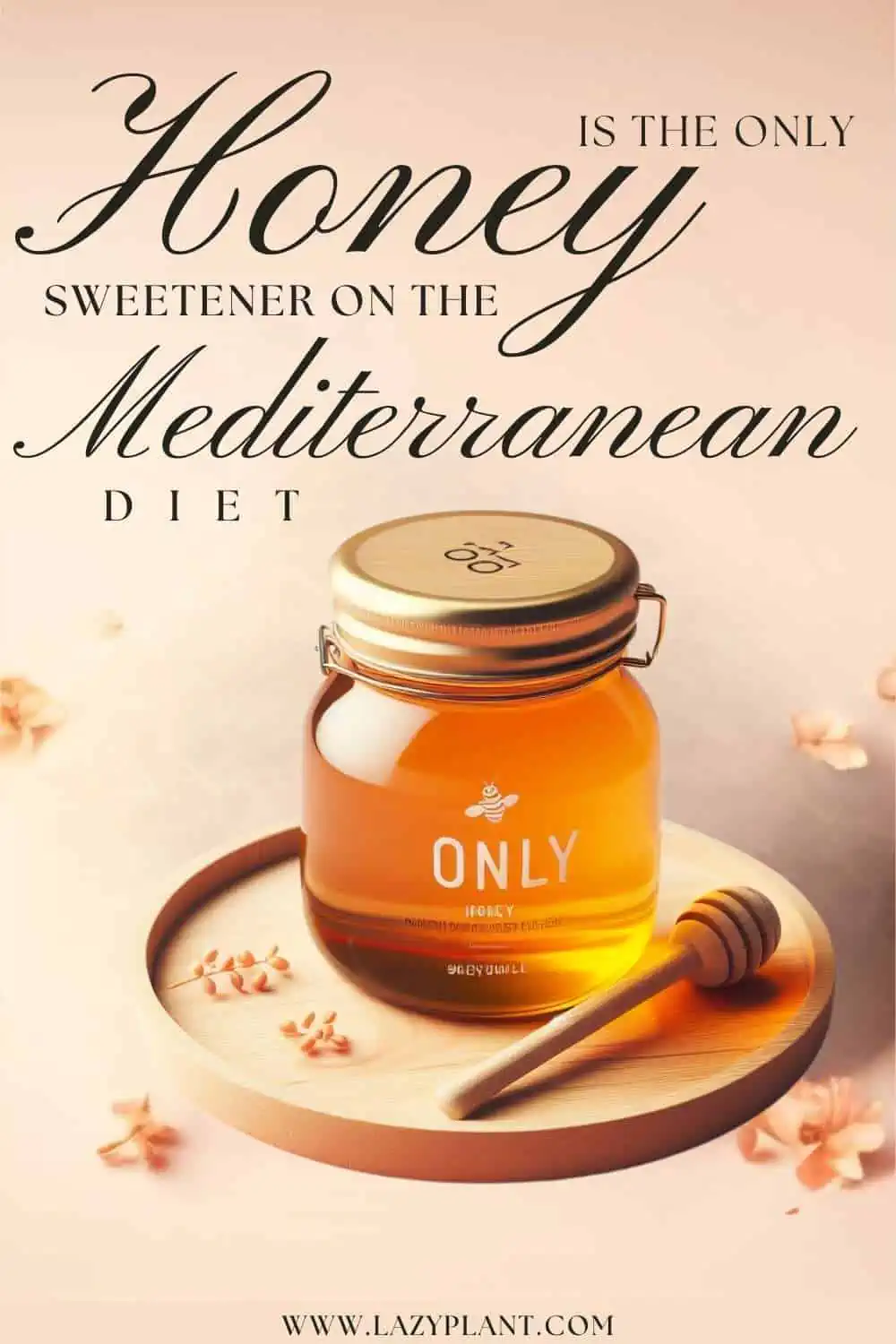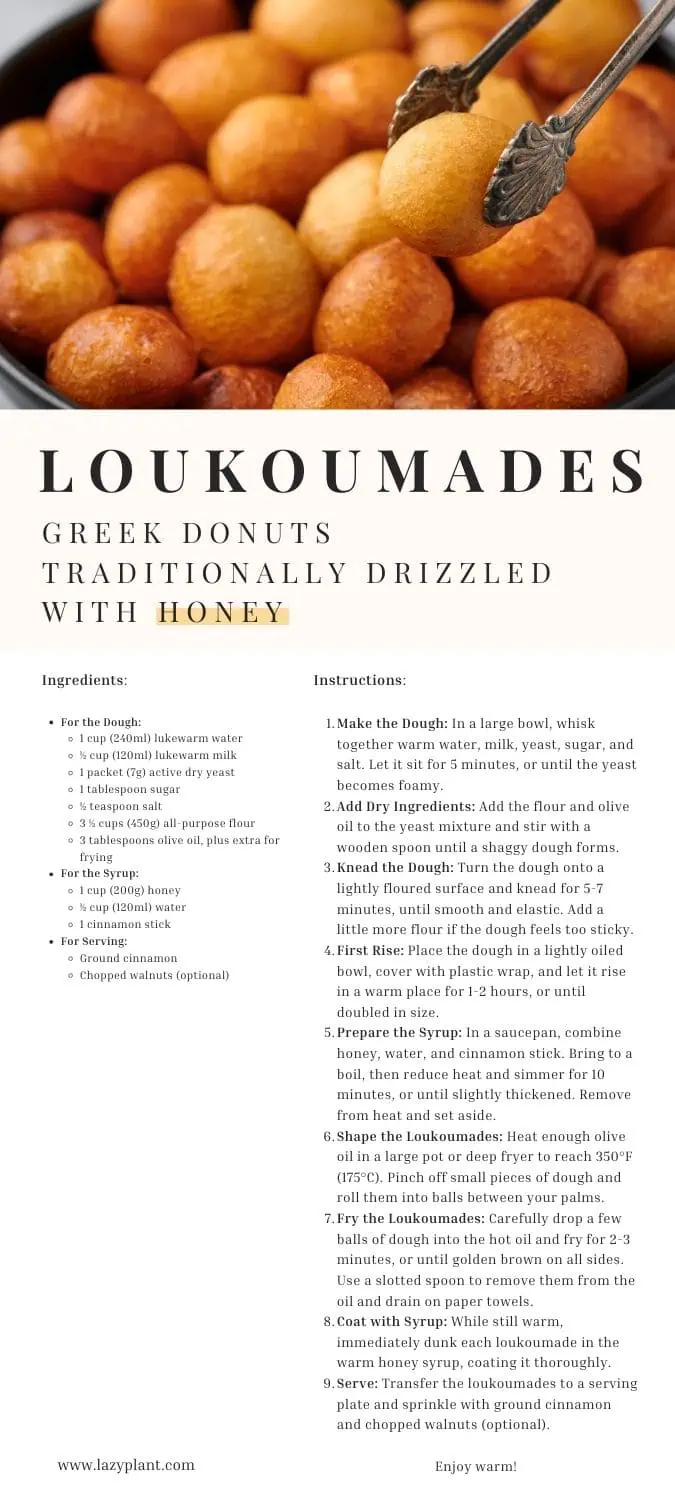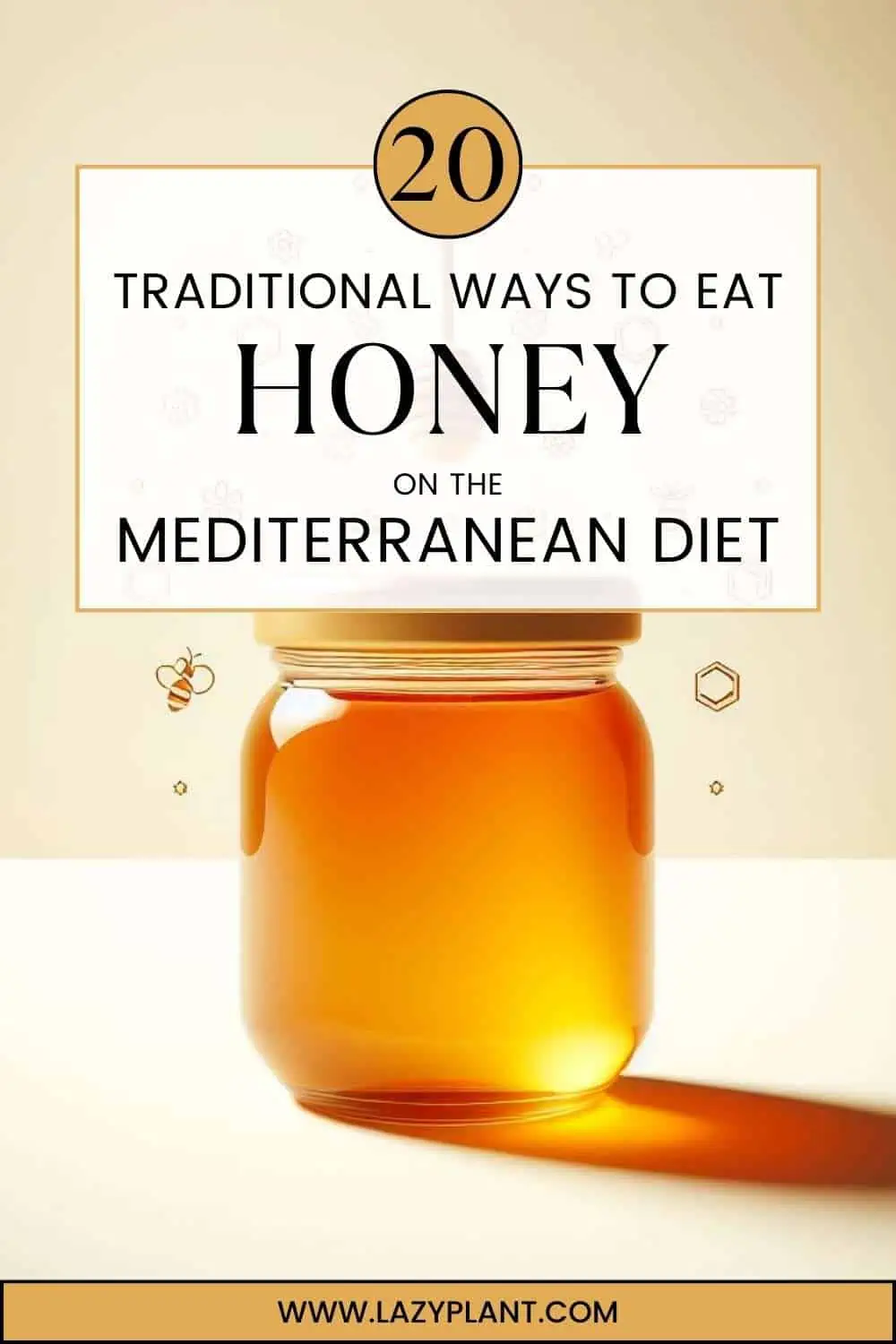Honey is the only sweetener that has been traditionally used in the Mediterranean diet for centuries. It is believed to have many health benefits due to its many phenolic compounds. Ancient Greeks and Egyptians ate honey in desserts, drank it with wine or milk, or applied it to skin for wound healing. Many ancient philosophers, historians, and mythical persons consumed honey and praised its health benefits.
Why should I follow the Mediterranean diet?
The Mediterranean diet is a way of eating inspired by the traditional foods and cuisine of countries bordering the Mediterranean Sea. It’s not a fad diet with strict rules, but rather a focus on healthy habits and delicious food.
Studies show the Mediterranean diet is linked to a lower risk of developing several chronic illnesses, including heart disease, type 2 diabetes, and some cancers.[1]
The diet goes beyond just calories and fat. It offers protection against oxidative stress (cell damage), inflammation, and blood clotting issues.
The Mediterranean diet may influence hormones and growth factors that play a role in cancer development and might promote the growth of good gut bacteria, which can improve overall metabolic health.
The emphasis on plant-based foods and healthy fats can promote feelings of fullness and potentially support weight management efforts.
Research suggests that people who follow the Mediterranean diet tend to live longer.
What are the main food options in a Mediterranean diet?
The Mediterranean diet offers a wide variety of flavorful foods, making it enjoyable and easy to follow in the long term. You can eat:
- Lots of Plants: Fruits, vegetables, whole grains, and legumes are the foundation of the diet.
- Healthy Fats: Olive oil is the primary source of fat, providing beneficial monounsaturated fats.
- Moderate Protein: Fish and seafood are included regularly, with smaller portions of poultry and limited red meat.
- Limited Processed Foods: Sugary drinks, refined grains, and processed meats are discouraged. Honey and fruits are the main sweeteners!
- Herbs and Spices: Fresh herbs and spices add flavor without relying on excessive salt.
Portion Control: The diet emphasizes mindful eating and enjoying meals without overdoing it.
Can you eat honey on the Mediterranean diet?
Yes, you can eat honey on the Mediterranean diet. Not only is honey consumed for centuries in the Mediterranean region but it also has a superior phytochemical and antioxidant profile that protects your heart and might reduce the risk of the most common chronic pathologies, such as cancer. It has recently been classified as a functional food.[2]
History of Honey consumption in the Mediterranean
Greek honey production dates back to ancient times, with evidence suggesting its cultivation since the Neolithic period.
The earliest evidence of honey collection comes from cave paintings in Spain dating back over 9,000 years BCE. These depict people climbing trees to reach honeycombs.
Some of the earliest documented evidence of beekeeping comes from Ancient Egypt around 3,000 BCE. Hieroglyphs and tomb paintings depict beekeeping practices.
Excavations in Crete have unearthed artifacts from the Minoan period depicting honey-related items, dating back to 3400 BCE.

Historical texts by Homer and Hesiod mention wild bees in caves and trees, indicating early beekeeping practices in Greece. The Greek poet Homer praised honey’s nutritional properties in the Iliad, mentioning its use by Agamemnon to prepare a refreshing drink called “Kykeon” for Greek warriors.
During the Golden Age of Pericles, beekeeping in Athens was highly organized, leading to regulations by Solon to prevent conflicts between beekeepers.
Aristotle’s writings depict bee societies as models of ideal governance.
The first Beekeeper
In Greek mythology, Aristaeus, son of Apollo and Cyrene, is sometimes credited as the first beekeeper. He was believed to be a demigod associated with agriculture and beekeeping. He was taught beekeeping by the nymphs and became revered by humans for it.
Aristaeus was teaching beekeeping skills to the inhabitants of Kea. However, he’s a mythical figure, not a historical person.
Mythology
Aristaeus’ story includes the unintentional causing of his beloved Eurydice’s death, leading to the creation of bees as a means to appease nymphs.
In Greek mythology, nymphs were a vast class of minor female nature spirits. They were closely associated with various aspects of nature, such as forests, water bodies, mountains, and even clouds.
Melissa, another figure in Greek mythology, is associated with bees. She was transformed into a bee queen by Zeus out of gratitude for her role in saving him from Cronus.
Bees and honey are linked to various deities such as Artemis, Demeter, and Hera, either through offerings or as symbols of their attributes.
Ambrosia, the food of the gods, was based on honey. Demeter was believed to have prepared it for the immortals.
Hera offered honey to the gods to ensure eternal youthfulness. She was the wife of Zeus, the king of the gods on Mount Olympus.
Honey is depicted as a divine food, believed to confer immortality and strength.
How people used to consume honey?
Greek honey was not only consumed on its own but also utilized in various products and recipes, showcasing its versatility and cultural significance.
Ancient Greeks consumed honey in various forms, including:
- pasteli (Greek honey sesame bars) and
- tiganites (similar to pancakes).
Greek honey was also utilized in the production of sweets and desserts.
Furthermore, honey was used in beverages like:
- melikraton (milk with honey)
- oxymel (vinegar with honey, used as a fever reducer)
- hydromeli (a sweet drink resulting from the alcoholic fermentation of honey), and
- oinomeli (honey dissolved in wine, popular in ancient Athens)
Health benefits
Honey had significant importance in Ancient Greece, not only as a food but also as a medicine, with references from prominent figures like Hippocrates, Pythagoras, and Aristotle endorsing its health benefits.
Honey held medicinal significance in Ancient Egypt, as evidenced by its mention in the papyrus of Eberes, dating back 3600 years, where it was used for wound healing and stomach ailments.[3]
Honey’s ability to resist spoilage made it a valuable addition to the embalming process, potentially helping to preserve bodies.
There’s evidence suggesting Egyptians might have consumed honey for coughs, sore throats, and digestive issues. Also, honey may be used in eye washes or treatments.
Philosophers like Pythagoras attributed their longevity to the systematic consumption of honey, while Democritus lived to be 100 years old, consuming honey regularly in his diet.
Hippocrates, considered the father of medicine, utilized honey against various diseases and as a dietary staple.
Anacreon, the poet, lived for 115 years, attributing his longevity to honey consumption.
Honey was seen as a versatile natural remedy, addressing a wide range of ailments. It was also believed to enhance athletic performance and stamina.
Hippocrates, considered the father of modern medicine, frequently used honey in his treatments. He believed it had various benefits, including:
- Wound healing and ulcer treatment
- Soothing coughs and sore throats
- Reducing pain and inflammation
- Treating eye diseases
- Even acting as a laxative or contraceptive
Mediterranean Honey varieties
Different regions of Greece cultivated various types of honey, ranging from floral to forest varieties. Various regions were known for producing different types of honey with distinct characteristics and uses.
Located near Athens, Mount Hymettus was renowned for its thyme honey, prized for its delicate flavor and light color. References to Hymettus honey appear in the writings of Aristotle and other Greek figures.
The island of Crete likely had various honey varieties depending on the region’s specific flora. Thyme, sage, and wildflower honeys might have been prominent.
The Peloponnese peninsula, with its diverse landscape, could have produced a range of honeys, including pine, heather, and citrus varieties.

The fertile Nile Delta region, with its abundance of flowers and clover, might have been a source of clover honey, known for its mild sweetness.
Punt (Land of Punt) is a mysterious land, possibly located in modern-day Somalia or Eritrea was known for its trade with Egypt. Some theories suggest they might have provided unique honey varieties.
What makes Mediterranean Honey unique?
The Mediterranean region boasts a rich variety of flowering plants, herbs, and citrus trees. This diversity can contribute to unique honey flavors and aromas depending on the region and beehives’ location. Examples include:
- Thyme honey is prized for its delicate floral aroma and light color, particularly from Mount Hymettus in Greece.
- Citrus honey from orange, lemon, or tangerine blossoms can offer citrusy notes.
- Maquis honey comes from the aromatic shrubs of the Mediterranean Marquis ecosystem, known for its complex flavor profile.
- Multifloral honey from Greek islands has potent antibacterial action, similar to the famous Manuka Honey from New Zealand.[4]
Many Mediterranean beekeepers maintain traditional beekeeping methods that prioritize bee health and minimal intervention. This can potentially lead to higher quality honey.
In some regions, honey might come from unmanaged beehives foraging on wildflower meadows, offering a more diverse and potentially “untouched” flavor.
Some Mediterranean beekeepers might offer raw honey, which retains more pollen, enzymes, and potentially some health benefits compared to processed honey.
Health benefits
Honey has been used for centuries for both culinary and medicinal purposes. While some of the historical beliefs haven’t been fully verified by modern science, honey does offer some potential health benefits. Potential Benefits are:
- Wound Healing: Honey’s antibacterial properties might be helpful for wound healing. Studies suggest it can promote tissue regeneration and reduce inflammation.
- Soothing Coughs and Sore Throats: Honey’s coating properties can soothe a sore throat and suppress coughs.
- Antioxidant Effects: Honey contains antioxidants that can help protect your cells from damage. However, the concentration of antioxidants is generally lower compared to other sources like fruits and vegetables.
- Digestive Issues: Some studies suggest honey might have prebiotic effects, promoting the growth of good bacteria in the gut. This could potentially aid digestion.
- Potential Benefits for Athletes: Honey’s natural sugars can provide a source of energy during exercise while polyphenols in honey accelerate recovery.
Moreover, reasonable amounts of honey can play a beneficial role in weight loss!
Honey can be a delicious and potentially beneficial addition to a healthy diet. However, it’s crucial to consume it in moderation and focus on whole, unprocessed foods for optimal health.
If you have any underlying health conditions, consult your doctor before incorporating honey into your diet.
Are other popular Sweeteners allowed on the Mediterranean diet?
On the Mediterranean diet, added sugars are generally discouraged. Honey is the main sweetener that used for centuries.[5]
Refined sugar (white sugar or brown sugar) is not recommended due to its lack of nutrients and potential contribution to health problems.

The Mediterranean diet emphasizes familiar, traditional flavors, so stevia might not be a perfect fit, despite being a natural, calorie-free sweetener,
A small amount of maple syrup can be used occasionally, but it’s higher in sugar content than honey. Moderation is key. In either case, it isn’t a traditional ingredient in the Mediterranean diet.
Agave nectar is high in fructose, which can have negative health effects. Overconsumption may stress the liver. It’s best to avoid it on the Mediterranean diet.
How much honey can I eat on a Mediterranean diet plan?
Even honey should be consumed in moderation on the Mediterranean diet. You can eat only a teaspoon (about 5 grams) a day.[6]
Use a drizzle on recipes, snacks, or desserts.
Even in ancient times, elite classes were more affected by certain diseases like atherosclerosis than the less well-off ones. The abundant consumption of honey, sugar, and fatty meats significantly increases the risk of obesity and diabetes![7]
How to incorporate Honey into your daily diet routine?
Honey is used sparingly in the Mediterranean diet. A drizzle (around 1-2 teaspoons) adds a touch of sweetness without overshadowing the natural flavors.
It can enhance the natural sweetness of fruits in yogurt parfaits or salads. Also, honey can add a touch of sweetness to marinades for meats or glazes for vegetables.
Pairing with Fruits
Breakfast
Greek Yogurt with Honey and Berries: A classic and healthy option. Combine plain Greek yogurt with a drizzle of honey and top with fresh berries like blueberries, raspberries, or strawberries. For added crunch, sprinkle with chopped nuts or granola (use a low-sugar variety for the Mediterranean diet).
Honey-Oatmeal with Figs and Walnuts: A warm and satisfying breakfast. Cook oatmeal with water or milk, add a touch of honey for sweetness, and top with chopped dried figs and walnuts. The figs add a natural sweetness and fiber, while the walnuts provide healthy fats.
Snacks
Honey-Roasted Pears with Ricotta: A delicious and elegant snack. Core and halve pears, brush them with melted honey, and roast until tender. Top with dollops of ricotta cheese and a sprinkle of chopped pistachios.

Fruit and Honey Skewers: A fun and portable snack perfect for kids and adults alike. Thread your favorite fruits like melon, grapes, pineapple, and strawberries onto skewers. Drizzle with a light honey glaze and enjoy.
Honey-Baked Apples with Cinnamon: A simple and warming dessert. Core and stuff apples with a mixture of chopped walnuts, raisins, and a sprinkle of cinnamon. Drizzle with honey and bake until tender and bubbly. Top with a dollop of Greek yogurt for extra protein.
Lunch/Dinner
Mediterranean Quinoa Salad with Honey-Glazed Figs: A protein-packed and flavorful salad. Combine cooked quinoa with chopped vegetables like cucumber, tomatoes, red onion, and crumbled feta cheese. Roast some fresh figs with a touch of honey for a sweet and savory topping. Drizzle with a simple olive oil and lemon juice dressing.
Yogurt & Kefir
Greek Yogurt with Berries and Honey: Ingredients: 1 cup plain Greek yogurt, 1/2 cup mixed berries (fresh or frozen), 1-2 tsp honey, chopped nuts (optional). Instructions: Layer yogurt in a bowl, top with berries, drizzle with honey and sprinkle with nuts for added crunch (almonds, walnuts, or pistachios).
Honey-Spiced Kefir Smoothie: Ingredients: 1 cup kefir, 1/2 banana, a handful of spinach, 1/4 tsp ground cinnamon, 1/4 tsp ground ginger, 1-2 tsp honey. Instructions: Blend all ingredients until smooth. Add a splash of water or milk if needed for desired consistency.
Honey-Roasted Fig and Kefir Smoothie: Ingredients: 1 cup kefir, 2 fresh figs (roasted for 10 minutes with a drizzle of honey), 1/2 banana, 1 tsp ground cinnamon, 1-2 tsp honey. Instructions: Roast figs with a touch of honey. Blend all ingredients until smooth. Enjoy a warm or chilled smoothie.
Start consuming kefir today! It’s the richest common food in probiotics which promote gut health. It supports weight loss and boosts immunity!
Cereals
Overnight Oats with Honey and Nuts: Ingredients: 1/2 cup rolled oats, 1 cup unsweetened almond milk, 1/4 cup chopped dates, 1-2 tsp chia seeds, 1-2 tsp honey, pinch of salt. Instructions: In a jar, combine oats, almond milk, dates, chia seeds, honey, and salt. Stir well, cover, and refrigerate overnight. Enjoy cold it in the morning.
Herbal Teas
A small amount of honey can sweeten herbal teas for a more flavorful drink.
Calming Chamomile: Known for relaxation and promoting restful sleep. A drizzle of honey complements the floral notes of chamomile.
Digestive Mint Delight: Peppermint and spearmint can aid digestion and soothe an upset stomach. Honey adds a touch of sweetness without overpowering the mint’s refreshing flavor.
Ginger Powerhouse: Ginger tea can help with nausea and inflammation, and may even boost the immune system. Honey balances the spiciness of ginger, creating a warming and soothing drink.
Citrusy Lemongrass Love: Lemongrass may offer antibacterial and antifungal properties. Honey complements the citrusy aroma and adds a touch of sweetness.
Echinacea for Immunity: Echinacea is traditionally used to support the immune system, although research is ongoing. Honey adds a touch of sweetness to the earthy flavor of echinacea.
Refreshing Hibiscus Punch: Hibiscus tea might have blood pressure-lowering properties. Honey balances the tartness of hibiscus, creating a refreshing drink.
Traditional Mediterranean desserts with Honey
Here are some traditional Mediterranean desserts featuring honey:
Baklava (Greece): This rich and flaky pastry is a classic Mediterranean dessert. Layers of phyllo dough are filled with chopped nuts and soaked in a sweet syrup flavored with honey and spices.
Kanafeh (Levant): Kanafeh is a rich and decadent dessert made with shredded phyllo dough, cheese, and nuts. It’s soaked in a syrup flavored with orange blossom water and rose water.

Loukoumades (Greece): Loukoumades are Greek honey donuts. They are light and fluffy on the inside and crispy on the outside, traditionally drizzled with honey and sprinkled with cinnamon.
Tulumba (Turkey): Tulumba are deep-fried pastries made from a light and fluffy dough. They are soaked in a syrup flavored with honey and lemon juice and then sprinkled with cinnamon.
Galaktoboureko (Greece): This creamy custard pie is made with phyllo dough, semolina custard, and lemon. It’s typically baked and then soaked in honey syrup.
Qatayef (Middle East): Qatayef are small pastries made from a thin dough filled with nuts or cream. They are fried or baked and then soaked in a syrup flavored with honey and rose water.
Kataifi (Greece): Kataifi is a shredded phyllo dough pastry filled with chopped nuts and drizzled with honey. It’s a popular dessert throughout the Middle East and the Mediterranean.
Traditional Remedies
Here are some traditional Mediterranean remedies for sore throat and cough with honey:
Honey and Lemon Lozenges: This is a simple yet effective remedy. Combine honey and lemon juice in equal parts to create a soothing lozenge-like consistency. Let it solidify slightly before sucking on it throughout the day.
Sage Tea with Honey: Sage has natural antiseptic properties and can help soothe a sore throat. Steep a teaspoon of dried sage leaves in hot water for 5 minutes, strain, add a drizzle of honey, and gargle or sip slowly.
Thyme with Honey: Thyme is another herb known for its antiseptic qualities. Steep a teaspoon of dried thyme in hot water for 5 minutes, strain, add a drizzle of honey. Gargle several times a day.
Warm Milk with Honey and Turmeric: Milk provides a soothing coating for the throat, while turmeric has anti-inflammatory properties. Warm a cup of milk, add a pinch of turmeric and a drizzle of honey. Stir well and sip slowly.

Ginger with Honey: Ginger has anti-inflammatory properties that can help reduce throat pain. Grate fresh ginger into hot water, let it steep for a few minutes, strain, add a drizzle of honey, and gargle several times a day.
Red Wine: This remedy is controversial. While some believe red wine’s tannins can numb a sore throat, it can also irritate it further. If you choose to try it, dilute a small amount of red wine with warm water and gargle briefly. In any case, the regular consumption, of small amounts of red wine might boost your immune system.
Onion Steam with Honey: This might sound strange, but inhaling the steam from chopped onions can help loosen mucus and ease a cough. Boil chopped onions with water, remove from heat, and carefully inhale the steam for a few minutes. Afterward, have a soothing drink like warm water with honey.
Herbal Steam with Honey: Combine various herbs like eucalyptus, peppermint, or chamomile in hot water. Create a tent with a towel over your head and inhale the steam for a few minutes. Afterward, enjoy a warm drink with honey.
These remedies are passed down through generations but lack strong scientific evidence for effectiveness. Always consult a doctor for persistent coughs or sore throats, especially if accompanied by fever, difficulty breathing, or other concerning symptoms.